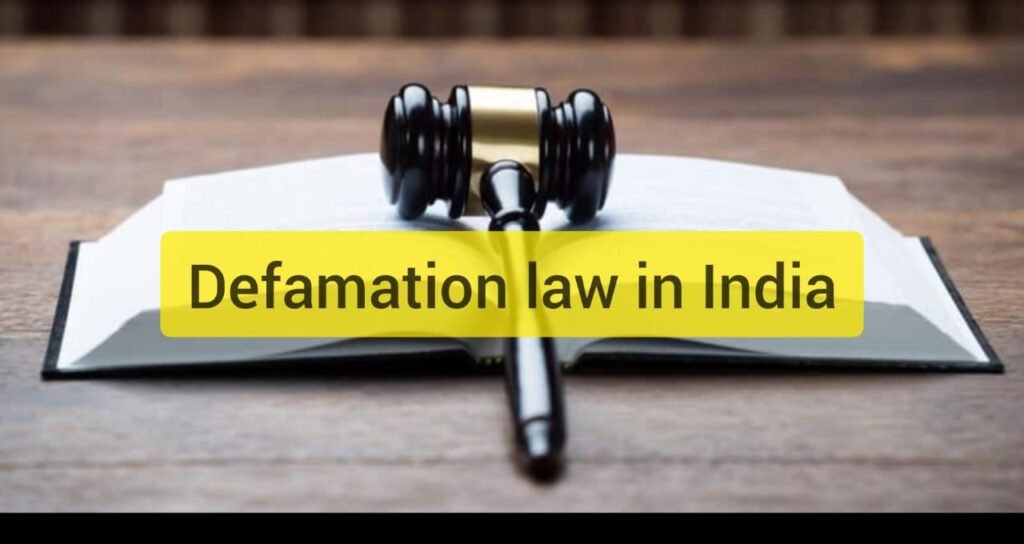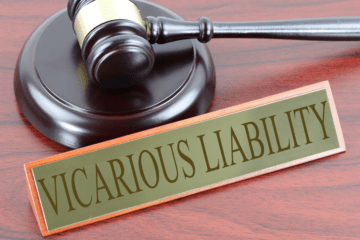
Defamation is the act of saying false things in order to down other person’s reputation. It is a wrong done by one person to another’s reputation by words spoken or written, signs or other visible representation. A man’s reputation is considered to be his most valuable property. It is quite often said that a property lost can be regained but a reputation once lost can never be recovered. That is why defamation is considered as a civil as well as a criminal offence punishable under the Indian Penal Code. Under the Criminal law,
Defamation is a bailable, non-cognizable and compoundable offence. Thus, police have no authority to arrest a person without warrant for defamation the Indian Penal Code punishes the offence with simple imprisonment up to two years, or with fine, or both. It is defined under Section 499 and punishment is defined under Section 500 of IPC, 1862.
According to Section 499 of IPC, “Whoever, by words either spoken or intended to be read, or by signs or by visible representations, makes or publishes any imputation concerning any person intending to harm, or knowing or having reason to believe that such imputation will harm, the reputation of such person, is said, except in the cases hereinafter expected, to defame that person”.
In Mustaq Ahmed Mir vs Akash Amin Bhatt[i], HC of J&K held that if a person does not possess sufficient worldly possession, then it doesn’t mean that he doesn’t have any respect in the society. The reason being that respect and reputation of a person is not dependent on how much wealth he has and what is his financial status, because such an assumption would be unreasonable and to one’s conscience.
According to Winfield, “Defamation is the publication of a statement which tends to be lower a person in the estimation of right-thinking members of the society generally or, which tends to make them shun or avoid that person”.
According to Salmond, “the wrong of defamation consist in the publication of a false and defamatory statement respecting another person without lawful justification or excuse”.
Thus, defamation is injury to the reputation of a person. A man’s reputation is property, and if possible, more valuable, than his other property.
There are five key elements of Defamation and these are as follows:
- A statement of fact
- A published statement (communicated to third person)
- Statement must be false and defamatory
- The statement caused injury to the plaintiff
- The statement is not privileged i.e., there is no reasonable or legal justification for such statement.
Provision under constitution
Though Article 19 of the Indian Constitution grants various freedoms to its citizens, but there are some restrictions also. Article 19(2) has imposed reasonable exemption to freedom of speech and expression granted under Article 19(1) (a) and defamation is one of them. It is considered as an inherent personal right of every person against the world at large. Therefore, in jurprudential term it is “jus in rem”.
In Byrne v. Deane[ii], the allegation of the plaintiff was that someone had posted a typed notice on the notice board stating that the plaintiff was not loyal to the golf club because he had reported to the police that there were some gambling machines kept in the premises of the club which need to be removed. In this case the court rejected the claim of the plaintiff for defamation and said that it could not be a defamatory statement that a person had reported to the police about a crime or an unlawful act.
In M.L. Singhal v. Pradeep Mathur[iii], the defendant’s wife died due to the negligence of the doctor and the hospital staff. Defendant made a complaint against the concerned doctor alleging his negligence and incompetence in rendering proper treatment to the patients and because of this the doctor’s name was not considered for higher post. Thus, he filed a suit for defamation but it was dismissed by Delhi HC on the ground that allegation against medical practitioner for negligence does not constitute a case for actionable defamation.
Kinds of Defamation
There are mainly two forms of Defamation
(1) Libel,
(2) Slander.
According to Blackstone Libel consist of written statement including a printed picture, film etc. which subjects a person to hatred or contempt in the eyes of people in general. It is obviously a false statement and permanent in firm and is punishable as an offence. On the other hand, Slander is a false statement made verbally or through gestures which is transient in nature. Thus, slander is less severe as compared to libel even in England slander is not considered as an offence.
- Libel
Libel means it is a publication of a false or defamatory statement in some permanent form. For example, in writing, picture, statue etc. it is actionable per se.
- Slander
It is false or defamatory verbal or oral statement and it is not permanent. It can be done either by spoken words or gestures. It is generally regarded as being addressed to ear. It is not actionable per se but there are some exceptions where it can be actionable per se for example, imputation of virulent disease etc.
Difference between Libel and Slander:
| Libel | Slander |
| Libel is visible and permanent in form. | Slander is transient in form. |
| Under English law it is considered a crime as well as tort. | But Slander is not a crime under English Law. |
| Libel is actionable per se. | Slander is not actionable per se and plaintiff has to prove actual damages. |
| It is a result of malice of defendant towards plaintiff. | But it can be made by sudden provocation. |
| Libel is generally concerned with eyes as it is visible. | Slander is mainly concerned with ears. |
| Libel is more severe as compared to slander. | It is less severe in nature. |
Innuendo ( In few cases it is also considered as defemation)
Sometimes the statement may not be prima facie defamatory and they appear to be innocent in their natural and ordinary sense, but because of secondary meaning, it can be defamatory.
In Purshottam Lal v. Prem Shankar[iv], the defendant commented that the plaintiff can be easily purchased to give evidence on payment merely 10 or 20 chips (rupees), it was held to be a defamatory statement because it implied that the plaintiff was a professional fake witness.
Defences in an action for Defamation:
Apart from general defences, there are some special defences available to a defendant in an action for defamation against him. These are as follows:
- Justification or truth
- Fair comment
- Privilege, which may be either absolute or qualified
- Apology
Justification or truth :- Truth is one of the most important defence available to the defendant because only false statement against a plaintiff constitute defamation. Hence a person is not liable for defamation if a statement made by him is true.
In Alexender vs. North East Rly. Co.[v], the defendant published a statement in news that the plaintiff had been convicted for travelling in a train without a ticket and he was sentenced to a fine of 1 Euro with an alternative of three weeks imprisonment, whereas in fact, the alternative was two weeks imprisonment. The plaintiff filed a suit against the railway for defamation. The court held that the statement was substantially true and the defendant was not liable.
Fair Comment: – The term ‘fair comment’ implies comments honestly believed to be true and not vitiated by malice or untrue facts. A fair and bonafide comment on a matter of public interest is a defense in an action defamation. In order to take this defence, the defendant must show:
- That the facts alleged are true
- The person making statement believes it to be true
- Subject matter of the comment is of public interest
- Privilege
Privilege:- it is a defence or immunity given conferred by law on statement or communication made on certain occasions however, defamatory or malicious they may be. It is justified on the ground that on certain specified occasions it is necessary to enable a person to express his views freely and frankly on the matters of public interest.
It can be of two kinds (1) Absolute Privilege (2) Qualified Privilege
In absolute privilege as defence, the defendant has only to show that the statement was made by him on occasions which are considered absolutely privileged for the purpose of communication and this defence extends even to the statements which are false and made intentionally. Absolute Privilege is available in following cases-
- Parliamentary Proceedings
- Fair and Accurate reports of Parliamentary Proceedings
- Judicial Proceedings
Qualified privileges are available only when the defendant had made a statement honestly and carefully. A communication is said to be covered under qualified privilege if it is made about a person in discharge of some duty which may be legal, moral or social, whether public or private.
Apology:- In case a person making defamatory statement later issues apology, he can be escaped from the liability. Strictly speaking, an apology is not a defence to an action for defamation but is only a circumstance which may help in mitigating damages. There is no statutory provision recognising apology as a defence to an action for defamation in India.
Case Laws: –
In D.P.Choudhary v. Manjulatha[vi], the defendant made a publication in the local newspaper, Dainik Navjyothi that the plaintiff a 17 year old college girl ran away with a boy. This false statement and it had ruined her image or reputation. It was actionable per se and she was awarded damages of Rs.10000/- by way of general damages.
In Mahendra Ram Vs. Harnandan Prasad[vii], the defendant sent a letter to the plaintiff which was written in Urdu language but the defendant knew that plaintiff don’t understand Urdu therefore he need some another person to read the same. Thus, it was held that since the defendant knew that the plaintiff did not know Urdu, the act of defendant amounted to defamation.
In Ram Jethmalani Vs. Subramanian Swamy[viii], in this the court held that Dr. Swamy is liable for defaming Ram Jetmalani by saying that he received money from a banned organization to protect the then Chief Minister of Tamil Nadu from the case of assassination of Rajiv Gandhi.
In Ramdhara Vs. Phulwatibai[ix], the plaintiff, a widow of 45 years was imputed that she is a keep of the maternal uncle of the plaintiff’s daughter in law. The court held that the statement made by the defendant is an imputation on her chastity and hence it was held defamatory.
In T.V.Ramasubha Iyer Vs. A.M.A.Mohideen[x], defendant published a statement without any intention to defame the plaintiff. It was related to a particular person carrying on business of Agarbathis to Ceylon has been arrested for the offence of smuggling. The plaintiff was also a person carrying on similar business and since his reputation was damaged, the court awarded him damages.
In Shreya Singhal Vs. Union of India[xi], the court held that Section 66A of the Information Technology Act, 2000 is unconstitutional as it punishes for sending offensive messages through communication services.
[i] AIR 2010 J&K 11.
[ii] (1937) I KB 818
[iii] AIR 1996 Del. 261
[iv] AIR 1966
[v] (1865) 6 B & S 340
[vi] AIR 1997 Raj 170
[vii] AIR 1958 Pat 445
[viii] AIR 2006 Delhi 300
[ix] 1970 CriLj 286
[x] AIE 1972 Mad 398
[xi] 24 March, 2015
xii. Dr. N. V. Paranjape, Law of Torts (4th ed. 2019)




0 Comments